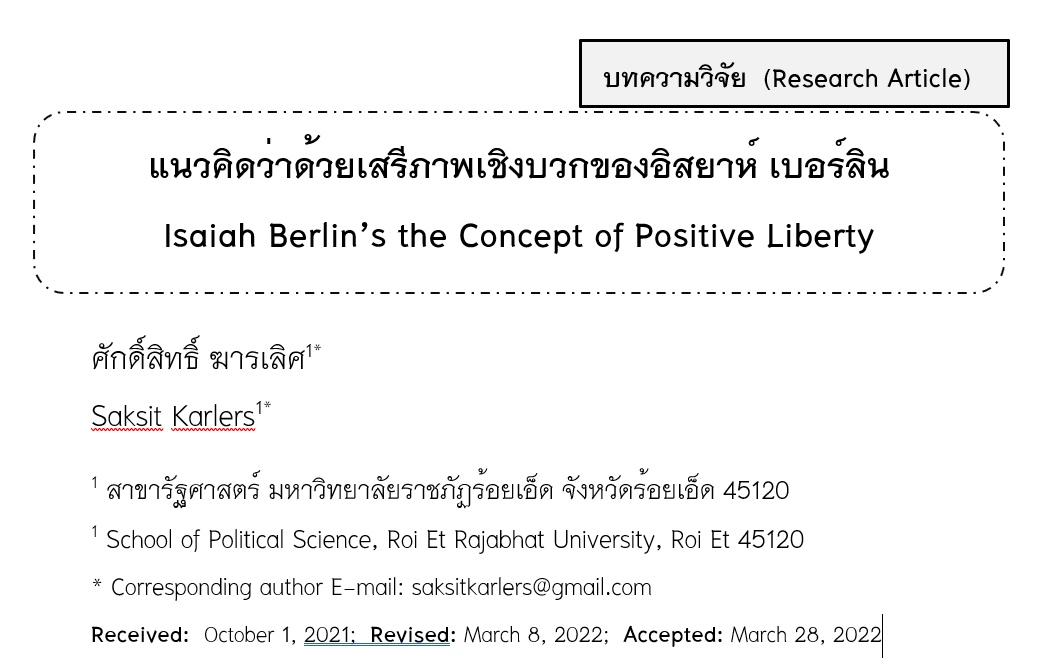แนวคิดว่าด้วยเสรีภาพเชิงบวกของอิสยาห์ เบอร์ลิน
คำสำคัญ:
อิสยาห์ เบอร์ลิน, เสรีภาพ, เสรีภาพเชิงบวกบทคัดย่อ
บทความชิ้นนี้มีวัตถุประสงค์เพื่ออธิบายแนวคิดว่าด้วยเสรีภาพเชิงบวกของอิสยาห์ เบอร์ลิน กล่าวคือ การศึกษาในครั้งนี้ใช้การวิจัยเชิงเอกสาร และวิธีการศึกษาแบบปรัชญาการเมือง ผ่านการตีความวิเคราะห์ตัวบทอย่างละเอียด ผลการศึกษาพบว่า เสรีภาพเชิงบวก คือ ความเป็นไปได้ที่จะกระทำ หรือการกระทำได้จริงในลักษณะที่เราสามารถควบคุมชีวิตของเราเองได้ และบรรลุเป้าหมายพื้นฐานของเราเองได้ ดังนั้น เสรีภาพเชิงบวกจึงเกี่ยวข้องกับการมีทรัพยากรและอำนาจในการดำเนินการเพื่อดำเนินชีวิตตามวิถีทางใดทางหนึ่ง หรือบรรลุการตระหนักรู้บางอย่างในตนเอง ซึ่งมีเป้าหมายในการเอื้อประโยชน์หรือสนับสนุนให้จเจกบุคคลมีอิสรภาพผ่านมาตรการของรัฐและสังคม
เอกสารอ้างอิง
ศักดิ์สิทธิ์ ฆารเลิศ. (2021). “เสรีภาพเชิงลบ” คืออะไร ? : บทวิเคราะห์อิสยาห์ เบอร์ลิน. วารสารการบริหารปกครอง, 10(2), 112-133.
Berlin, Isaiah. (1969) Two Concepts of Liberty. In Four essays on liberty. London: Oxford University Press, 118-172.
Darity, W.A., Jr. (Ed.) (2008). Liberty. In International Encyclopedia of the Social Sciences. Detroit, MI: Macmillan Reference USA, 439-441.
Gadamer, Hans-Georg. (1976). Philosophical Hermeneutics. In David E. Linge (Ed.), Berkeley: University of California Press.
Gadamer, Hans-Georg. (1988). Truth and Method In Joel. Weinsheimer and Donald G. Marshall (Eds.), New York: Continuum.
Goldfinger, Johnny. (2011). Modern Liberalism, Conservatism, and Libertarianism. In John T. Ishiyama and Marijke Breuning (Eds.), 21st Century Political Science: A Reference Handbook Thousand Oaks, CA: SAGE Reference, 615-624.
Gombert u.a., Tobias. (2009). Foundations of social democracy. Berlin: Friedrich-Ebert-Stiftung.
Hadas, E. (2013). Liberalism. In R. L. Fastiggi (Ed.), New Catholic Encyclopedia Supplement 2012-2013: Ethics and Philosophy. Detroit, MI: Gale, 892-895.
Hanson, R. L. (2003). Liberty, Concept of. In S. I. Kutler (Ed.), Dictionary of American History New York, NY: Charles Scribner's Sons, 94-95.
Merriman, John. and Winter, Jay. (Eds.) (2006). Berlin, Isaiah (1909–1997). In Europe Since 1914: Encyclopedia of the Age of War and Reconstruction. Detroit, MI: Charles Scribner's Sons, 350-352.
Plamenatz, John. (1963). Man and society Volume one: a critical examination of some important social and political theories from Machiavelli to Marx. London: Longman.
Shogimen, T. (2005). Liberty. In M. C. Horowitz (Ed.), New Dictionary of the History of Ideas. Detroit, MI: Charles Scribner's Sons, 1272-1279.
The Isaiah Berlin Association of Latvia. (2011). Isaiah Berlin: Life. In The Isaiah Berlin Association of Latvia. Retrieved from http://www.isaiahberlin.org/system/articles/en_pdfs/000/000/005/original/Isaiah_ Berlin.Life.pdf?1400230847.
Zackin, Emily. (2016). Rights, Negative. In Stephen Schechter, Thomas S. Vontz, Thomas A. Birkland, Mark A. Graber, and John J. Patrick (Eds.), American Governance. Farmington Hills, MI: Macmillan Reference USA, 318-320.

ดาวน์โหลด
เผยแพร่แล้ว
รูปแบบการอ้างอิง
ฉบับ
ประเภทบทความ
สัญญาอนุญาต
ลิขสิทธิ์ (c) 2022 มหาวิทยาลัยพะเยา

อนุญาตภายใต้เงื่อนไข Creative Commons Attribution-NonCommercial-NoDerivatives 4.0 International License.
ผู้นิพนธ์ต้องรับผิดชอบข้อความในบทนิพนธ์ของตน มหาวิทยาลัยพะเยาไม่จำเป็นต้องเห็นด้วยกับบทความที่ตีพิมพ์เสมอไป ผู้สนใจสามารถคัดลอก และนำไปใช้ได้ แต่จะต้องขออนุมัติเจ้าของ และได้รับการอนุมัติเป็นลายลักษณ์อักษรก่อน พร้อมกับมีการอ้างอิงและกล่าวคำขอบคุณให้ถูกต้องด้วย
The authors are themselves responsible for their contents. Signed articles may not always reflect the opinion of University of Phayao. The articles can be reproduced and reprinted, provided that permission is given by the authors and acknowledgement must be given.







